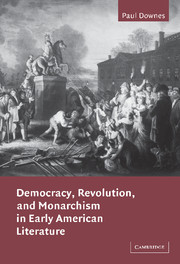Book contents
- Frontmatter
- Contents
- Preface
- Acknowledgments
- Introduction: the spell of democracy
- 1 Monarchophobia: reading the mock executions of 1776
- 2 Crèvecoeur's revolutionary loyalism
- 3 Citizen subjects: the memoirs of Stephen Burroughs and Benjamin Franklin
- 4 An epistemology of the ballot box: Brockden Brown's secrets
- 5 Luxury, effeminacy, corruption: Irving and the gender of democracy
- Afterword: the revolution's last word
- Notes
- Bibliography
- Index
1 - Monarchophobia: reading the mock executions of 1776
Published online by Cambridge University Press: 22 September 2009
- Frontmatter
- Contents
- Preface
- Acknowledgments
- Introduction: the spell of democracy
- 1 Monarchophobia: reading the mock executions of 1776
- 2 Crèvecoeur's revolutionary loyalism
- 3 Citizen subjects: the memoirs of Stephen Burroughs and Benjamin Franklin
- 4 An epistemology of the ballot box: Brockden Brown's secrets
- 5 Luxury, effeminacy, corruption: Irving and the gender of democracy
- Afterword: the revolution's last word
- Notes
- Bibliography
- Index
Summary
In metaphorical terms, the colonials killed their king in 1776.
(Edward Countryman, The American Revolution, 125)The body is with the king, but the king is not with the body.
(William Shakespeare, Hamletiv.ii 29–30)Philip Freneau was the poet laureate of American anti-monarchism. As early as 1775 (in “A Political Litany”), he was calling for delivery from “a royal king Log, with his tooth full of brains,” (Freneau, Poems, III, 141), and in the aftermath of the war he put as much effort into reminding his readers of what had been left behind as into imagining what was to come. For Freneau, the United States were fundamentally post-monarchic:
Forsaking kings and regal state,
With all their pomp and fancied bliss,
The traveller owns, convinced though late,
No realm so free, so blest as this –
The east is half to slaves consigned,
Where kings and priests enchain the mind.
(“On the Emigration to America,” in Freneau, Poems, II, 280)Twenty years later, in the wake of the French Revolution and with Thomas Paine's Rights of Man by his side, Freneau remained passionate about the object of patriotic loathing:
With what contempt must every eye look down
On that base, childish bauble called a crown,
The gilded bait, that lures the crowd, to come,
Bow down their necks, and meet a slavish doom.
(“To A Republican With Mr. Paine's Rights of Man,” in Freneau, Poems, Ⅲ, 90)- Type
- Chapter
- Information
- Publisher: Cambridge University PressPrint publication year: 2002



